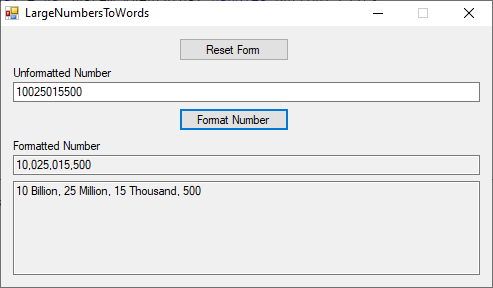This allows conversions from up to 66 digit numbers to Short Scale numbers (i.e Millions, Billions, etc).
The numbers are entered as Strings via a TextBox. As the largest standard .Net Integer number is ULong with a MaxValue of 18,446,744,073,709,551,615 and there is no need for using a true numeric Type, this app. uses Strings to store the (max) 3 digit parts of the number.
After checking the user input contains only numeric digits, the number is passed to a new instance of the xl_Integer Class.

Imports System.Text.RegularExpressions Public Class Form1 Private Sub Button1_Click(ByVal sender As System.Object, ByVal e As System.EventArgs) Handles Button1.Click If New Regex("^\d+$").IsMatch(TextBox1.Text) Then Dim xlInt As New xl_Integer(TextBox1.Text) TextBox2.Text = xlInt.toFormattedString TextBox3.Text = xlInt.toWords Else TextBox2.Text = "" TextBox3.Text = "" MsgBox("Invalid Input") End If End Sub Private Sub Button2_Click(ByVal sender As System.Object, ByVal e As System.EventArgs) Handles Button2.Click TextBox1.Text = "" TextBox2.Text = "" TextBox3.Text = "" End Sub End Class
This is the xl_Integer Class, which is an Information Specialist utility Class. Each new instance of this Class is passed a numeric String. That String is then split into (max) 3 digit parts.
Invoking the toFormattedString() Function groups the (max) 3 digit parts into a numeric formatted String. Invoking the toWords() Function converts the numeric parts into a String using Short Scale number names.
Public Class xl_Integer Dim parts As New List(Of String) Public Sub New(ByVal largeNumber As String) For x As Integer = largeNumber.Length To 0 Step -3 parts.Add(largeNumber.Substring(Math.Max(x - 3, 0), Math.Min(3, x))) Next End Sub Public Function toFormattedString() As String Dim reversedParts(parts.Count - 1) As String parts.CopyTo(reversedParts) reversedParts = reversedParts.Reverse().ToArray Return String.Join(",", reversedParts).TrimStart(","c, " "c) End Function Public Function toWords() As String Dim strSuffix() As String = {"", " Thousand", " Million", " Billion", _ " Trillion", " Quadrillion", " Quintillion", " Sextillion", _ " Septillion", " Octillion", " Nonillion", " Decillion", _ " Undecillion", " Duodecillion", " Tredecillion", " Quattuordecillion", _ " Quindecillion", " Sexdecillion", " Septendecillion", " Octodecillion", _ " Novemdecillion", " Vigintillion"} Dim output As String = "" For x As Integer = 0 To parts.Count - 1 output = If(Val(parts(x)) > 0, CStr(Val(parts(x))) & strSuffix(x) & ", " & output, output) Next Return output.TrimEnd(","c, " "c) End Function End Class
The example project is available for download here...